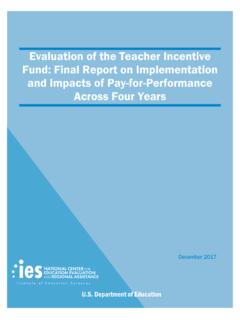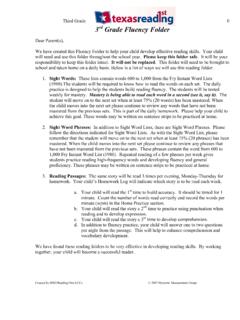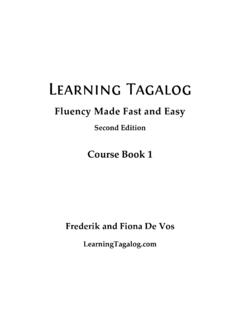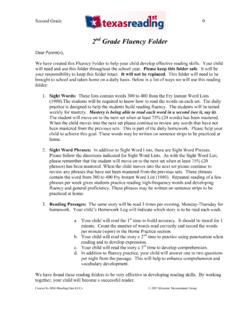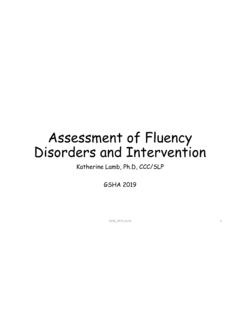Transcription of Foundational Skills to Support Reading for Understanding ...
1 EDUCATOR S PRACTICE GUIDE A set of recommendations to address challenges in classrooms and schoolsWHAT WORKS CLEARINGHOUSE Foundational Skills to Support Reading for Understanding in Kindergarten Through 3rd GradeNCEE DEPARTMENT OF EDUCATIONA bout this practice guide The Institute of Education Sciences (IES) publishes practice guides in education to provide educa-tors with the best available evidence and expertise on current challenges in education. The What Works Clearinghouse (WWC) develops practice guides in conjunction with an expert panel, com-bining the panel s expertise with the findings of existing rigorous research to produce specific recommendations for addressing these challenges.
2 The WWC and the panel rate the strength of the research evidence supporting each of their recommendations. See Appendix A for a full de-scription of practice guides. The goal of this practice guide is to offer educators specific, evidence-based recommendations for teaching Foundational Reading Skills to students in kindergarten through 3rd grade. This guide is a companion to the existing practice guide, Improving Reading Comprehension in Kindergarten Through 3rd Grade, and as a set, these guides offer recommendations for preparing students to be successful readers. Both guides recommend some practices that can and should be imple-mented beginning in kindergarten, and both guides also suggest some instructional practices that can be implemented after students have mastered early Reading Skills .
3 This guide synthesizes the best available research on Foundational Reading Skills and shares practices that are supported by evidence. It is intended to be practical and easy for teachers to use. The guide includes many examples in each recommendation to demonstrate the concepts guides published by IES are available on the WWC website at How to use this guideThis guide provides teachers, Reading coaches, principals, and other educators with instructional recommendations that can be implemented in conjunction with existing standards or curricula and does not recommend a particular curriculum.
4 Teachers can use the guide when planning in-struction to Support the development of Foundational Reading Skills among students in grades K 3 and in diverse contexts. Professional-development providers, program developers, and researchers can also use this guide. Professional-development providers can use the guide to implement evidence-based instruction and align instruction with state standards or to prompt teacher discussion in professional learn-ing communities. Program developers can use the guide to create more effective early- Reading curricula and interventions. Finally, researchers may find opportunities to test the effectiveness of various approaches to Foundational Reading education and explore gaps or variations in the Reading -instruction Practice GuideFoundational Skills to Support Reading for Understanding in Kindergarten Through 3rd GradeJuly 2016 PanelBarbara Foorman (Chair)Florida State UniverSity andFlorida Center For Reading reSearChMichael CoyneUniverSity oF ConneCtiCUtCarolyn A.
5 DentonChildren S learning inStitUte,UniverSity oF texaS health SCienCe Center at hoUStonJoseph DiminoinStrUCtional reSearCh groUpLynda yonge developmental reSearCh SChool,UniverSity oF FloridaLaura Justiceohio State UniverSityWarnick LewisBond elementary SChool,leon CoUnty, FloridaRichard WagnerFlorida State UniverSity andFlorida Center For Reading reSearChStaffNicholas BeylerKelley BorradaileJoshua FurgesonJuliette HenkeBetsy KeatingSamina SattarAndrei StrekeSarah WisselmathematiCa poliCy reSearChProject OfficersDiana McCallumVanessa AndersoninStitUte oF edUCation SCienCeSNCEE DEPARTMENT OF EDUCATIONThis report was prepared for the National Center for Education Evaluation and Regional Assistance, Institute of Education Sciences, under the What Works Clearinghouse contract to Mathematica Policy Research (Contract ED-IES-13-C-0010).
6 Disclaimer The opinions and positions expressed in this practice guide are those of the authors and do not necessarily represent the opinions and positions of the Institute of Education Sciences or the Department of Education. This practice guide should be reviewed and applied according to the specific needs of the educators and education agency using it, and with full realization that it represents the judgments of the review panel regarding what constitutes sensible practice, based on the research that was available at the time of publication. This practice guide should be used as a tool to assist in decision making rather than as a cookbook.
7 Any references within the document to specific education products are illustrative and do not imply endorsement of these products to the exclusion of other products that are not referenced. Department of Education John B. King, Jr. Secretary of Education Institute of Education Sciences Ruth Neild Deputy Director for Policy and Research, Delegated Duties of the DirectorNational Center for Education Evaluation and Regional Assistance Joy Lesnick Acting Commissioner July 2016 This report is in the public domain. Although permission to reprint this publication is not necessary, the citation should be as follows: Foorman, B.
8 , Beyler, N., Borradaile, K., Coyne, M., Denton, C. A., Dimino, J., Furgeson, J., Hayes, L., Henke, J., Justice, L., Keating, B., Lewis, W., Sattar, S., Streke, A., Wagner, R., & Wissel, S. (2016). Foundational Skills to Support Reading for Understanding in kindergarten through 3rd grade (NCEE 2016-4008). Washington, DC: National Center for Education Evaluation and Regional Assistance (NCEE), Institute of Education Sciences, Department of Education. Retrieved from the NCEE website: citation for this What Works Clearinghouse practice guide begins with the panel chair, followed by the names of the panelists and staff listed in alphabetical report is available on the IES website at Formats On request, this publication can be made available in alternate formats, such as Braille, large print, or CD.
9 For more information, contact the Alternate Format Center at (202) 260-0852 or (202) 260-0818.( iii )Table of ContentsFoundational Skills to Support Reading for Understanding in Kindergarten Through 3rd GradeTable of ContentsIntroduction to the Foundational Skills to Support Reading for Understanding in Kindergarten Through 3rd Grade Practice Guide .. 1 Recommendation 1. Teach students academic language Skills , including the use of inferential and narrative language, and vocabulary knowledge ..6 Recommendation 2. Develop awareness of the segments of sounds in speech and how they link to letters.
10 14 Recommendation 3. Teach students to decode words, analyze word parts, and write and recognize words .. 22 Recommendation 4. Ensure that each student reads connected text every day to Support Reading accuracy, fluency , and comprehension .. 32 Glossary .. 38 Appendix A. Postscript from the Institute of Education Sciences .. 43 Appendix B. About the Authors .. 47 Appendix C. Disclosure of Potential Conflicts of Interest .. 51 Appendix D. Rationale for Evidence Ratings.. 52 References .. 91 Endnotes .. 99( iv )Table of Contents (continued)( iv )List of TablesTable Recommendations and corresponding levels of evidence.


